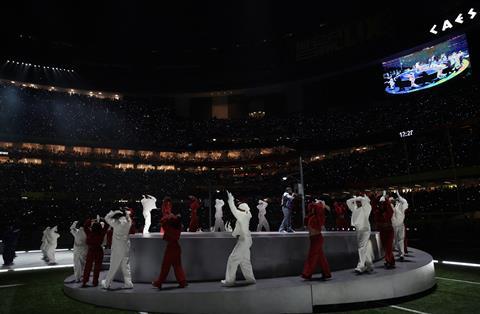Turning Point USA and Christian musicians Forrest Frank and Cory Asbury have called for an alternative, family-friendly Super Bowl halftime show. But instead of creating competing entertainment, believers should focus on addressing the deeper issues surrounding America’s biggest sporting event, argues Brenna Blain

Over recent weeks, there’s been a growing buzz around plans for an alternative halftime show to be aired during the 2026 Super Bowl.
Two versions of this ‘alternative’ have gained traction — one funded and promoted by Turning Point USA, the Christian political organisation founded by the late Charlie Kirk. The other by Christian music artists Forrest Frank and Cory Asbury.
Both proposed events have garnered praise from those eager for a different halftime experience. Some Christians are excited - finally, a place where believers can gather and watch something wholesome while the secular world indulges in spectacle - but before we celebrate too loudly, it’s worth pausing to ask a deeper question: What exactly are we celebrating, and why?
If we look closely, both options may reveal more about our misplaced motivations than our holy imagination.
Political piety
Let’s start with the Turning Point USA–backed event. When a political organisation that traffics in partisan rhetoric presents itself as a Christian alternative, we must exercise discernment. Scripture warns repeatedly against confusing the kingdom of God with the kingdoms of men. Jesus told Pilate: “My kingdom is not of this world” (John 18:36). To merge the two is to dilute both.
Christian nationalism - or any attempt to wrap political allegiance in Christian language - is not faithfulness; its idolatry dressed as devotion. It trades the humility of the cross for the spectacle of influence. It seeks cultural victory rather than resurrection hope.
The concern here is not that believers hold conservative values or participate in political life. Engagement in public policy can be good and faithful. The problem is when that engagement masquerades as the gospel - when ‘conservative’ becomes shorthand for ‘Christian’. That is not discipleship; it’s brand loyalty.
When Christians promote or attend an event that fuses the name of Christ with partisan identity, we send a message to the watching world; that following Jesus means belonging to a political camp. We narrow the wide mercy of God into the size of our voting bloc. And in doing so, we risk defaming the sacrificial, compassionate love of neighbour that marks true discipleship.
Entertainment piety
Then there’s the other halftime show - the one hosted by Forrest Frank and Cory Asbury. At first glance, it seems purer. These are artists who genuinely love Jesus and want to glorify him. But even here, there’s something worth wrestling with.
Have we mistaken entertainment for witness? If the Church’s response to the world’s halftime show is simply to create our own version - same timing, same spectacle, same draw - have we really done anything different? Or have we just baptised amusement in Christian language?
When the world gathers for entertainment, the Church has an opportunity to show up differently: to serve, to intercede, to give, to repair. The Super Bowl is historically linked to sex trafficking, drug trafficking and gambling - realities that tear apart families and exploit the vulnerable. The people of God are already mobilising to intercede and intervene in these areas, but what would it look like to put that at the front and centre of a halftime show?
That would be a subversive, gospel-shaped response - not a competing concert, but a countercultural compassion.
Holy caution and critical thought
Now, to be fair, we don’t yet know all the details. It’s possible that both events will raise money for worthy causes, highlight ministries fighting human trafficking, or lift up the name of Christ in public spaces. If that happens, we should rejoice. But caution and celebration are not mutually exclusive.
Even as we hope for good, we must still ask: What motivates us? Do we care more about creating an alternative form of amusement or demonstrating a radically different way of love?
When the world gathers for entertainment, the Church has an opportunity to show up differently
Jesus didn’t offer the world a cleaner version of Rome. He offered the cross. He didn’t build an alternative empire; he built a kingdom that looked foolish to the powerful. When the Church mimics the forms of worldly success - whether political or entertainment - we risk losing our prophetic voice.
Paul warns the Corinthians that “the weapons of our warfare are not the weapons of the world” (2 Corinthians 10:4). Our power is not in platforms, visibility or brand management. It is in the quiet, consistent witness of love - the kind that feeds the hungry, visits the prisoner and prays for those who persecute us.
Show up differently
The question isn’t whether Christians can create art, media, or political impact - of course we can and should. The question is whether our motivation mirrors Christ. Do we seek to make his love known, or to make ourselves comfortable?
If the halftime show, alternative or otherwise, becomes about protecting our subculture or showcasing our music, we have missed the moment. But if it becomes an opportunity to serve, give and care for those harmed by the very industries surrounding the Super Bowl, then it can bear witness to a kingdom that truly is “not of this world”.
We don’t need an alternative halftime show. We need an alternative people - the kind who show up in the streets, not just the stadiums; who choose intercession over imitation; who would rather wash feet than win airtime.
Let’s not be the Church that trades the cross for a concert. Let’s be the Church that trades comfort for compassion.


































No comments yet